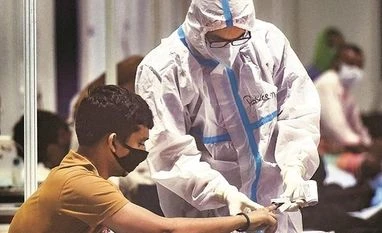As companies scale up production and newer technology comes to the fore, the cost of a Covid-19 test kit has come down significantly — from around Rs 1,200 in April to almost Rs 200 now. However, the gap between the cost of the kit to the laboratory and price of the test to the consumer has not reduced in the same proportion.
In Delhi and the National Capital Region alone, the price for an RT-PCR test for Covid ranges between Rs 1,600 and Rs 2,400. Most state governments have put a cap on the rate that can be charged for a Covid test.
Meanwhile, Covid test manufacturing companies have achieved much lower costs through economies of scale. Genes2me, for instance, now supplies RT-PCR test kits for Rs 400 to the government.
France-based diagnostic research company GeneStore has recently launched an RT-PCR detection kit — the most expensive component of the RT-PCR test — at a price of Rs 200. Back in May, it was available for anywhere between Rs 800 and Rs 1,200. “We were able to bring down our costs through reverse integration in our manufacturing process. From enzymes to primer, everything was made in our plant,” says Anubhav Anusha, Global CEO and R&D head, GeneStore.
Experts said the price of Covid tests can be brought down by half as companies increase volume of production and reduce their margins. Almost 100 companies have got the Indian Council of Medical Research’s approval to manufacture RT-PCR test kits as against just about a dozen in April when India had to import test kits.
Test kits made up half of the total cost of the tests in April. Now they are almost 16 per cent of the cost. This gap, experts feel, is too wide even when all the costs of labs are taken into account. Many labs in India have invested big amounts in automatic RNA extraction machines, which is an important part of the RT-PCR test — where a sample is prepared for detection. Not just that, additional costs related to Covid testing, too, have kept the prices high.
“I have to hire more people for data entry, rather than molecular PhDs, for Covid-19 testing. Each state follows a different format, which means we need to have a robust data entry team. All this adds to costs,” says a senior executive of a Delhi-based lab who requests not to be named.
While labs agree that accessibility and affordability of tests need to be improved, they feel that this isn’t sustainable if tests are at a loss to them.
“There is a certain quality we offer for the price we charge. We do not collect Covid-19 samples on bikes. Instead, we have air conditioned temperature-monitored cars with PPE gear for our technicians and a segregated box for biomedical medical waste. We use the highest standard of equipment available for automated RNA extraction and processing,” says Arjun Dang, CEO, Dang Labs.
In June, the Supreme Court had taken note of differences in Covid test prices across states and asked the government to fix an upper limit. The home ministry had revised the price cap on testing for Covid-19 to Rs 2,400 from the much higher levels of Rs 4,500.
Testing labs said that the price cut by the government factored fall in kit pricing. “We also need to understand that there are associated costs, which are not factored in for the revision, like costs of sample collection, viral transport media, logistics, biomedical waste management, staffing, equipment and infrastructure capex,” says Anand K, CEO, SRL Diagnostics.
He adds that there are additional costs pertaining to quality assurance, calibration and accreditation, data entry, 24x7 operational costs and the costs of increasing demand on improving the turnaround time.
However, many in the industry believe that low cost of testing could be the easiest and quickest way of helping businesses resume operations. “We don’t have to wait for the vaccine to open up the economy. Businesses can tie up with labs and repeat frequent testing of their employees to open up offices,” Anusha says.
It is not just the production and manufacturing that will drive the costs down, but also technology. For instance, the latest Feluda test by Council of Scientific and Industrial Research and Tata Group claims to cost only Rs 500. Companies are also planning to bring the saliva tests to India for large-scale validation. For the RT-PCR test itself, the component of RNA extraction is being done away with in many countries.
Manufacturers have suggested that they should be allowed to export test kits since the availability in India has exceeded the demand. “In the last six months, focus has been on reducing price by efficiencies of scale. With that in place now, if the government opens free export on RT-PCR, Indian companies can develop a strong global footprint, and go beyond Atmanirbhar Bharat,” says Saurabh Gupta, spokesperson, MyLab.
The ramped-up capacity for testing could also be redirected towards other infectious diseases post-Covid. “Excess manufacturing capacities will definitely lead to price and technological disruptions — extraction free, and RT-PCR free in the space of HIV and HCV,” Anusha says.
Unlock 30+ premium stories daily hand-picked by our editors, across devices on browser and app.
Pick your 5 favourite companies, get a daily email with all news updates on them.
Full access to our intuitive epaper - clip, save, share articles from any device; newspaper archives from 2006.
Preferential invites to Business Standard events.
Curated newsletters on markets, personal finance, policy & politics, start-ups, technology, and more.
)